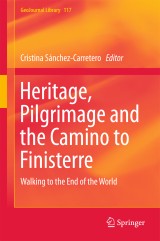Details

Heritage, Pilgrimage and the Camino to Finisterre
Walking to the End of the WorldGeoJournal Library, Band 117
|
53,49 € |
|
| Verlag: | Springer |
| Format: | |
| Veröffentl.: | 02.07.2015 |
| ISBN/EAN: | 9783319202129 |
| Sprache: | englisch |
Dieses eBook enthält ein Wasserzeichen.
Beschreibungen
<p>This book presents research concerning the effects of the Camino to Finisterre on the daily lives of the populations who live along the route, and the heritagization processes that exploitation of the Camino for tourism purposes involves. Rather than focusing on the route to Santiago de Compostela and the pilgrimage itself, it instead examines a peculiar part of the route, the Camino to Finisterre, employing multiple perspectives that consider the processes of heritagization, the effects of the pilgrimage on local communities, and the motivations of the pilgrims. The book is based on a three-year research project and is the result of a multidisciplinary collaboration between anthropologists, sociologists, historians and archaeologists. </p><p></p><p>Instead of ending in Santiago, as the rest of the Caminos do, this route continues to the cape of Finisterre on the Galician Atlantic coast. This part of the Camino de Santiago is not officially recognized by the Catholic Church and doesnot count as part of reaching Compostela, the recognition granted by the Catholic Church to those pilgrims who have walked at least 100 km. For this reason, as well as its relationship with the sun cult, many pilgrims call this route “the Camino of the atheists.” In fact, the Catholic Church is a strong force for the heritagization of the rest of the Caminos, and maintains a clear ignoratio strategy concerning the Finisterre route: Officially, the church neither opposes nor recognizes this route.</p>
Chapter 1: Introduction: Finisterre, Heritage and Pilgrimage; Cristina Sánchez-Carretero.- PART I: HISTORY, MYTHS AND LEGENDS OF THE END OF THE WORLD.- Chapter 2: Imagining an End of the World: Histories and Mythologies of the Santiago - Finisterre Connection; Peter Jan Margry.- Chapter 3: Analyzing the Camino: From Vindicating Local Elements to the Success of Xacobeo; Manuel Vilar Álvarez.- PART II: LOCAL IMPACTS OF THE PILGRIMAGE TO FINISTERRE.- Chapter 4: Heritagization of the Camino to Finisterre; Cristina Sánchez-Carretero.- Chapter 5: Socio-economic Impacts of the Camino to Finisterre; Eva Parga-Dans.- Chapter 5: Processes of Change in Olveiroa, a Village-hostel; Paula Ballesteros-Arias.- Chapter 6: Archaeological Heritage Management along the Camino to Finisterre; Carlos Otero-Vilariño.- PART III: SPIRITUALITY, MOTIVES AND THE END OF THE WORLD.- Chapter 7: To be or not to be,… a Pilgrim? Spiritual Pluralism on the Finisterre Trail; Peter Jan Margry.- Notes on the Contributors.- List of Illustrations.- Index.
Cristina Sánchez-Carretero is a staff researcher at the Institute of Heritage Sciences (Incipit) of the Spanish National Research Council (CSIC) in Santiago de Compostela, Spain. She was awarded a PhD by the University of Pennsylvania for her dissertation on the revitalization of religious practices among Dominican migrant workers in Spain (2002). Her areas of interest are: processes of traditionalisation and heritage formation; the intersection of migration and cultural heritage (in particular, the role of the revitalization of religious practices after migrating); and the role of rituals and expressive culture in contemporary societies. She has published extensively on these topics and has edited the books: Performance, arte verbal y comunicación (2000), with Dorothy Noyes; Holidays, Ritual, Festival, Celebration, and Public Display (2003), with Jack Santino; El Archivo del Duelo (2011); and Grassroots Memorials. The Politics of Memorializing Traumatic Death (Berghahn), co-edited with Peter Jan Margry (2011).
<p>This book presents research concerning the effects of the Camino to Finisterre on the daily lives of the populations who live along the route, and the heritagization processes that exploitation of the Camino for tourism purposes involves. Rather than focusing on the route to Santiago de Compostela and the pilgrimage itself, it instead examines a peculiar part of the route, the Camino to Finisterre, employing multiple perspectives that consider the processes of heritagization, the effects of the pilgrimage on local communities, and the motivations of the pilgrims. The book is based on a three-year research project and is the result of a multidisciplinary collaboration between anthropologists, sociologists, historians and archaeologists. </p><p></p><p>Instead of ending in Santiago, as the rest of the Caminos do, this route continues to the cape of Finisterre on the Galician Atlantic coast. This part of the Camino de Santiago is not officially recognized by the Catholic Church and doesnot count as part of reaching Compostela, the recognition granted by the Catholic Church to those pilgrims who have walked at least 100 km. For this reason, as well as its relationship with the sun cult, many pilgrims call this route “the Camino of the atheists.” In fact, the Catholic Church is a strong force for the heritagization of the rest of the Caminos, and maintains a clear ignoratio strategy concerning the Finisterre route: Officially, the church neither opposes nor recognizes this route.</p>
Focuses on heritage management and local population issues in the Camino, on the route to Finisterre Provides a new analysis of pilgrimage and heritage Delivers intriguing insights into efforts to market the “End of the World” Includes supplementary material: sn.pub/extras
Diese Produkte könnten Sie auch interessieren:

Observing Systems for Atmospheric Composition

von: Guido Visconti, Pietro Di Carlo, W. Brune, M. Schoeberl, Andreas Wahner

149,79 €















